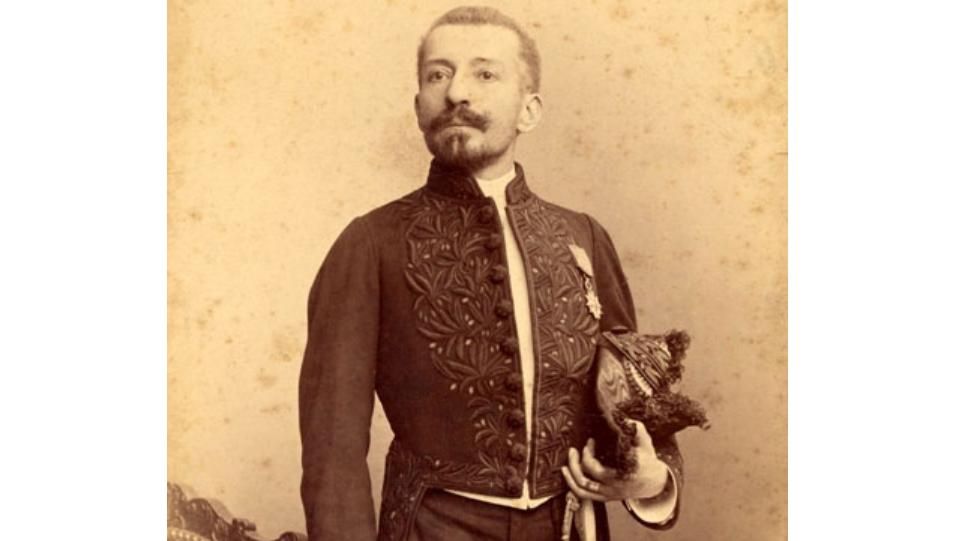Our officer announced a duel to him in 1913
Pierre Lotti argues that we have committed “shocking atrocities” in the war in the Balkans
The French writer Pierre Loti received a glove made from the skin of our lamb. In 1913 he slandered Bulgaria with his pen and was called to defend himself with sword in hand. Lieutenant Artag Torkom of our army announced a duel to him. The officer went all the way to Paris to wash his country’s dirty honor with blood.
Artag Torcom. The photo is published for the first time.
France was stunned by the dramatic confrontation. The two Duma, Hugo and Maupassant are now dead, will literature be orphaned by another great name?
Pierre Loti (1850-1923) was at that time among the most widely read authors in the world. He is one of the 40 “immortals” of the French Academy. As a naval officer he has traveled throughout the East and the East. He was in Turkey, Morocco, India, China, Japan. A pupil of the Goncourt brothers, the writer became famous with his first novel “Aziade” (1879). A “horribly moving” love story of a French lieutenant, behind which Lotti himself hides.
The narrator’s exotic style attracts the Bulgarian reader, although not everyone likes it. “I found it terribly monotonous,” says Ivan Vazov of him. Most, however, leaf through his books with fascination. “Icelandic fisherman”, “Away from home”, “Disappointed” are selling well.
The translator of “Far from Homeland” is Dr. Krstiu Krastev, who gives the volume as a prize to his magazine “Misl”. In 1913 an original and special edition of “Icelandic Fisherman” was printed. According to it, the Ministry of Education recommends high school students to learn the French language.
Educators do not suspect that the novelist is bisexual. When they put the essay in the school satchel, they don’t realize Lottie’s scandalous life. In “Aziade”, for example, the hero’s passion is split between a beautiful Turkish woman and a charming Turkish man. At different times, the writer has had intimate relationships with an underage Basque girl, with a smuggler and then with a belot player.
“Lottie’s bisexuality becomes a metaphor for an impossible choice between European progress and Eastern tradition, between integrity and freedom”, underlines her biographer.
In the same year, 1913, Pierre Loti slapped the Ministry of Education with a ferocious campaign against Bulgaria. At that time the Balkan war was raging, our weapons captured reduced after reduced. The Ottoman Empire is about to collapse and the writer decides to “save” the East.
He published a heartbreaking book entitled Agonizing Turkey, and the French press was flooded with his articles in defense of the empire. Loti called for the exclusion of Bulgarians from the family of civilized nations. He circulates facts about the “shocking atrocities” of our army. In the magazine “Illustration” he describes a well in the village of Havsa:
“A sinister stench emanates from it, the bodies of the women previously raped by the soldiers are thrown there, and above them, in order to insert them deeper into the well, are piled up gravestones torn from the cemeteries.”
The author also includes photographs in which our Francophone Dimitar Mikov discovers a clear hoax. “They don’t look at all like the Turkish prisoners drowned by Bulgarian soldiers, who stayed at the bottom of a well for a month”, Mikov stares at the photos and argues: “Their perfectly healthy uniforms, properly buttoned, without us the slightest trace of mud – everything it makes the attentive observer think that in front of him lie strong and healthy soldiers with the task of pretending to be drowned.One of them has even forgotten to take off his fez.
“It is inexplicable how these unfortunate Bulgarians do not feel that after so many horrors committed by them, it would be a thousand times better to bow your head and keep quiet”, replied Lotti from Paris.
This line pours the bitter into Lieutenant Artag Torkom’s cup. Armenian blood flows in his veins: he remembers the Turkish massacres of his compatriots at the end of the 19th century. On October 25, 1912, Torkom telegraphed asking the deputy commander in chief to be sent to the front. As company commander, he guides the boys through whirlwind attacks. He revenge both for Bulgaria’s five-century yoke and for the Armenian genocide.
Wounded in the fighting, by order of September 14, 1913, Torkom received two months’ leave for treatment abroad. The document says Austria, but the officer says otherwise. He sends a letter to Pierre Loti announcing a duel. Then he takes the train to Switzerland, from where he will jump to Paris to cross swords with the writer. Torkom puts a glove in the suitcase. According to the rules of the cavalry, the offended must throw it at the opponent’s feet.
Receiving Sophia’s letter, Lotti declared to the daily Figaro: “From the beginning I suspected that my conduct, of which I was proud, would one day bring me either a dagger or a Browning bullet.”
The author of “Aziade” hopes that the exalted foreigner will renounce his decision. However, he soon discovered that Torkom was already in the French capital. Lottie then snaps that “the one with the glove” probably isn’t with everyone. “I can’t believe that a group of officers from the same nation could be blinded enough to choose a person as their delegate,” he notes.
It is said in Parisian cafes that Artag Torkom was sent to duel on behalf of the entire Bulgarian army. Diplomatic complications arise and our legation is quick to refute the rumors. The second lieutenant arrived privately, our plenipotentiary minister Dimitar Stanchov said.
Pierre Lotti walks away, but Artag Torkom insists that he duel at all costs. The insult is too big to swallow, the Bulgarian officer insisted. The choice of weapon generously leaves it to the novelist. Saber or pishtov – as the master likes, Torkom tells his second-in-command.
However, they are holding on to the age of the storyteller. Lotti is already 63 years old, it is not right that the French graying faces a Balkan subject in the prime of life. The rules of the duel allow, in old age, that the satisfaction is taken by a relative of the resistant.
Who will fight the Bulgarian officer? Among Lottie’s many admirers, the draw was drawn by Georges Brettmeier. The choice is not accidental, because Georges is a skilled swordsman. He subtly knows the art of sword-wielding and has several won duels behind him.
The match will be at dawn on November 9, 1913, at the Manor of Montmerassie, the latter decide. At dawn, the men face each other. They raise their swords. Artag Torkom – for Bulgarian and Armenian valor. Georges Bretmeier – for Pierre Loti.
The fight is extremely fierce. It is immediately clear that Georges is several classes above Artag. The lieutenant receives a wound in his arm, but continues to duel. Then the Frenchman’s blade pierced his chest. Our officer dabs the blood with the palm of his hand and again wants to continue. The latter, on the other hand, are categorical: they stop the match!
After the duel, Pierre Lotti was overwhelmed by letters from Bulgaria. He does not even open them, because it is embarrassing for a naval officer to entrust the defense of his honor to another.


